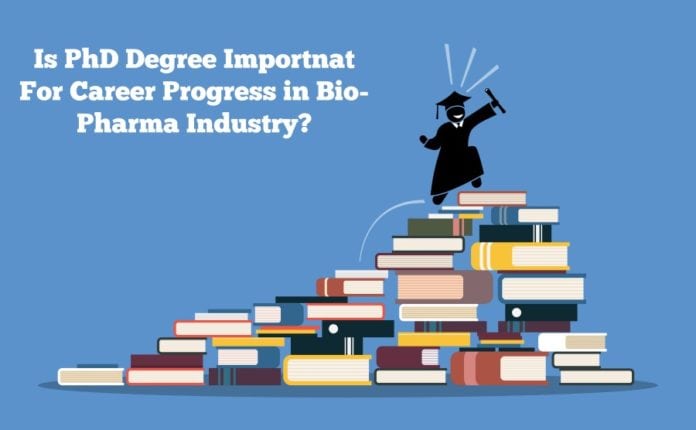Is Ph.D. Degree Necessary for Career Progress in Bio-Pharma Industry?
We’ve been receiving a lot of questions whether getting a Ph.D. Degree would be useful & advantageous for a career in Biotech & Pharma Industry. Well, this question comes up frequently especially for those who are highly interested in making their career biotech, who really have the belief that there is future in Biotech unlike those who blindly follow the crowd.
In truth, Ph.D. proves an accredited level of mastery, be it any field. Getting a Ph.D. depends on what you define as a “good career”. You can begin working as a researcher without studying Ph.D. but if you want to get a higher rank in the future, having a doctorate degree in biotech is your “Ticket to Promotion”.
In this article, we’ve compiled seven good reasons why you might need a Ph.D. in biotech or pharmaceutical industries.
Reason 1: You want to have a higher chance for promotion to an executive level
There are many success stories about how ordinary employees get to executive positions without studying Ph.D., and they’re very interesting. But most of these people have worked so hard for 20 to 30 years before they’ve reached their peak, nobody talks about this fact.
When you’re vying for
a promotion, sometimes the easiest way to get around it is to study Ph.D., have a Ph.D. degree. Of course, there will be a different set of struggles along the way, but it could help you get a promotion less than the time needed for non-PhDs.Industry Aspect: Biotech industries can also be very specific. For example, companies that focus on innovation technology research projects would prefer to have at least one Ph.D. who can oversee the project. In other words, a Ph.D. on a resume can make a difference between getting a promotion from a simple researcher to a technical expert and remain in a low position.
Reason 2: You want to have a higher salary grade than non-PhD candidates
According to a report in the journal Science, Ph.D. holders in science can earn as much as $20,000 more per year than non-PhD holders.
The average annual income of a Ph.D. fresh graduate with less than a year of experience is $80,000. Someone with a Ph.D. in Biotech earns up to six-figures after three to five years of experience.
At first, you may think that studying Ph.D. is a waste of time and money. But don’t fall for this trap. Think of it as a long-term investment. You may not realize its benefits within a short span of time but you’ll reap its greatest results in the long run.
Industry Aspect: For pharmaceutical and biotech industries, candidates with a Ph.D. are very attractive hires. In return, you will have a more advantageous position and a higher monthly payout – plus the opportunity to work something extra like teaching in a university.
When you’re a Ph.D., it means that you have a higher level of discipline and specialized knowledge. Biotech companies will be running after you for these things, which a typical undergraduate do not have.
Reason 3: You want a unique career option, which a normal Bachelor’s or Master’s degree holders does not have
Many people will probably tell you that studying Ph.D. is useless because you will have a job anyway, whether you’re a Bachelor’s degree or a Master’s degree holder.
However, we all know that for people who want to have multi-level carrier options this is not true. There are golden opportunities that are only exclusive to Ph.D. holders. For example, if you work in the academia, you can transition to industry position or vice versa.
Other career options include working as a market research analyst, competitive intelligence analysts, business development manager, or product manager. If you can picture yourself in these career 10 years from now, then getting a Ph.D. degree will be your best shot.
Industry Aspect: Aside from that, the Biotech industry is such a bias business. Hiring managers often overlook talented candidate with a Bachelor’s degree and award a unique job to someone with a Ph.D. degree. We’re not saying this to discriminate the industry but because of the tough competition, this scenario is likely unavoidable these days.
Reason 4: You want to have a certain level of confidence and a job satisfaction
Higher education attracts people who have high expectations for themselves. Thus, if you ever experienced having low self-esteem because of not being satisfied with what you have right now, it means you might want to pursue a Ph.D.
Getting a Ph.D. will give you self-satisfaction in the most meaningful way. In fact, this will help you earn respect from your Biotech peers like no one else has given you before.
If you want to vie for a high-ranking position in biotech, this could double your chance at getting it. In fact, at least 70 percent of Ph.D. graduates have found self-confidence and job satisfaction after getting what they’ve wanted.
The path of higher education is rough, but if you want confidence and job satisfaction, then getting a Ph.D. will help you do that.
Reason 5: You want to improve your writing skills, and eventually publish your research in a popular science journal
Well, most of the popular authors you’ve seen in scientific journals did not start as expert writers.
If you want to have your name included as one of the most influential people in biotech, getting a Ph.D. can be your best training ground to become an awesome writer.
When you study Ph.D. in Biotech, you will master the hardest part of the writing process – that is sitting down and getting started. You will learn to collaborate with other PhDs and learn valuable skills.
So even if you do not want to work in the academia, your writing skills will give you a more competitive edge to land a good industry position.
Industry Aspect: The good news is that the biotech industry is desperate to hire writers. They spend at least $3 billion every year to get the most talented writers on board just to get the ball rolling. If you want to be a part of this workforce, a Ph.D. will definitely give you more advantage.
Reason 6: You want to cope with your timid personality, develop strong interpersonal skills, and become a leader in the academia
Just because PhDs work alone for most of their student life doesn’t mean they’re shy. If you only know, Ph.D. holders are the best communicators because most of them work as a teamwork.
It’s where you can work with colleagues in a laboratory testing with sheer persistence. You will discover every person’s strength, weaknesses, and levels of experience which will help you learn how to control and project yourself when you’re with people.
Furthermore, when you study Ph.D. in Biotech, you will meet prestigious people. It could be a science author or a popular biotech innovator. When you graduate from your doctoral degree, you’ll come out with the best version of yourself.
So how does this give you a career advancement in biotech or pharmaceutical? The answer is simple. Both the academic and industry positions in biotech require great interpersonal and professional skills, which can be only learned after studying Ph.D.
The level of emotional intelligence and cooperation that it takes to work with a research team is higher with PhDs. It’s all about great attitude and how you handle yourself with a team.
If you want to become a respectable person and a leader that everyone can follow, getting a Ph.D. will truly be worth it.
Reason 7: Govt Has Made Ph.D. Degree Mandatory for Teaching Post, In future, it is to be implemented in other sectors as well.
Read this: Govt Circular Released: Ph.D. Mandatory From 2021
Govt is known to change rules abruptly, I hope you remember demonetization, Aadhar declared Mandatory and what not. The day is not far when a similar circular will be released stating that a Ph.D. Degree is Mandatory to be at a Scientist Post in Govt Research laboratories and even private ones too. So why you want to take the risk with your future self.
Ph.D. helps you raise the ceiling and get a better impression from biotech companies. In fact, there are people, who after working for 10 years, have ended up studying Ph.D. in their late 40s just to have a good research career.
Many people will say that Ph.D. holders have a similar level with people who have more than 10 years of experience in biotech. But one thing that is not common with experienced professionals and Ph.D. holders is the wide array of unique skills that the latter learn while completing a Ph.D.
These include having strong analytical skills, being able to communicate complex ideas both written and verbally and having multiple technical skills.
To summarize, getting a Ph.D. strongly depends on what you want to happen in your professional career. If you want all of the things mentioned here, then getting a Ph.D. Degree will give more advantage in the biotech and pharmaceutical industries.
In any case, you can always refer to this article as your guide. All the Best!

































